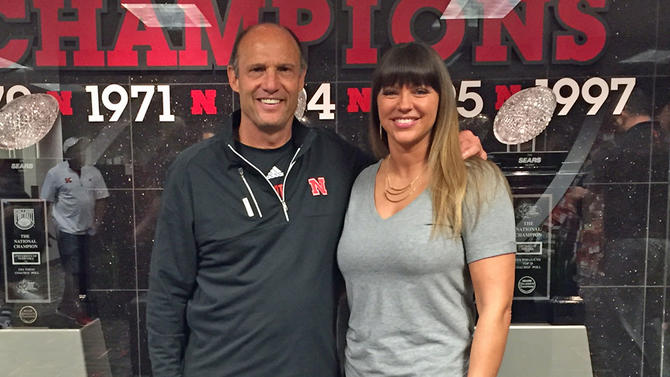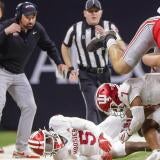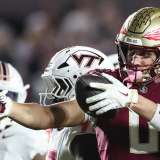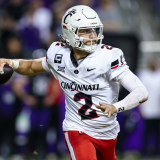For holding college football accountable, Brenda Tracy is my person of the year
Tracy is pushing an entire sport to finally get serious about sexual assault and violence against women

Call Brenda Tracy a sort of football mom, if you must. But the instincts of a 42-year-old registered nurse with two sons are more than maternal.
They have been life-altering. For her, for the coaches, for the athletes, for the culture of a game she'd like to clean up.
This year, Tracy took the anguish and pain of her gang rape at the hands of four men and transformed into a message sprawling across college sports: Violence against women must stop.
More to the point for the coaches she is trying to reach: If their players lay hands on a woman, they need to be off the team.
Make it a team rule. She understands there are gray areas and legal twists and those falsely accused. She gets all that.
She also reminds those coaches, "They have a bigger job than just win football games."
Tracy spent 2016 pushing that message. It largely caught the game, the NCAA and the game's coaches by surprise. It also made Tracy the most influential person of the year in college athletics.
More than the stars, the coaches, the plays and the championships, her message endured this season. It was deep and influential.
The story of her 1998 gang rape became public in 2014. Her advocacy developed over time. This year, it blossomed.
She called for the shut down of Baylor football in the wake of the sexual assault scandal. She confronted Nebraska coach Mike Riley, a man who she once hated "more than my rapists."
She has spoken about her experiences at 15 schools. The list is growing as she has been recommended to coaches and their programs by word of mouth.
No media member has been allowed to chronicle any of her appearances before teams, but just meeting her is enough. In 1998, two of the men who raped her just off campus at Oregon State were Beavers' players. Riley, the coach, merely suspended those two players and made them complete community service.
This summer, she was able to ask him why.
Tracy made friends with Oklahoma coach Bob Stoops this year but was not shy about admonishing him last week after the Joe Mixon tape was released.
If nothing else, her message is proactive. It points out the risk/reward of taking players with character issues.
And in not dealing with those issues once they surface.
"You might be bringing me [to speak to the team for public relations] reasons and fanfare, but I'm still planting the seed," she said.
Tracy will speak next month at the American Football Coaches Association national convention. She has no problem calling some of them out.
Coach, Your guys are standing in solidarity and support of sexual assault. This is NOT how you make the world better. https://t.co/AJKMaa9VuD
— Brenda Tracy (@brendatracy24) December 16, 2016
@JEMicklospic.twitter.com/iZmZHyaq1R
— Brenda Tracy (@brendatracy24) December 14, 2016
"A lot of people want to make me an angry feminist," she said. "They want me to wag my finger. I try to tell other advocates, I have to meet these men. I would love for them to know everything that I know."
Her assailants were never charged. Evidence was botched. Tracy was too traumatized and unfamiliar with proceeding through the legal process. A statute of limitations ran out.
Tracy believes at least some of them reside in Southern California today. She has seen social media references to her from persons that only the rapists would know.
The NCAA wants to study her. Tracy ran into Brian Hainline on a plane. According to her, the NCAA's chief medical officer was amazed how Tracy had shifted the national conversation.
What has emerged: The NCAA may partner with the Big 12 to study the conversation Tracy has created.
At her urging, the association has encouraged all three NCAA divisions to develop legislation to fight violence against women. She is part of an ad hoc committee studying sexual violence on campus.
Tracy made ESPNW's annual list of the top 25 influencers who have made the biggest difference for women in sports. The Big 12 paired her up with Ray Rice for a national forum to discuss violence against women by athletes.
An infamous video in 2014 featured Rice knocking out his future wife with a punch and dragging her out of an Atlantic City elevator.
"I listened to what he was saying," she said of Rice. "I don't condone what he did, but I support anyone who is in counseling and therapy. It doesn't make what he did OK."
It's all a start. Numbers show that more than 90 percent of sexual assaults go unreported. The usual reasons: fear, shame, concern over having to confront a perpetrator. No matter what your politics, one of the hallmarks of the Barack Obama administration has been forming a task force on the issue.
After enduring all that pain, Tracy found out there is a soft spot in her heart just to talk ... about the incident with others. It turned into a mission in life.
SMU's Chad Morris, Nebraska's Mike Riley and Stoops have become particularly close.
"They don't have to keep following me [on social media]," Tracy said. "They don't have to keep checking on me. They don't have to offer me support. The idea they do says something about them and who they are."

It wasn't a good year off the field for Oklahoma in 2014. That year they admitted Joe Mixon, Dede Westbrook and accepted transfer Dorial Green-Beckham.
All three had at least accusations of violence against women. That same year, linebacker Frank Shannon was also given a one-year suspension after being accused of sexual assault.
"We're talking about deeply held attitudes and belief of a society that has [been conditioned] to disregard all this," Tracy said. "I feel like being a person who has infiltrated football. I have to pick and choose my battles to stay in this world."
Like a lot of us, she has seen the Mixon tape and was sickened. If you look close at the tape, you'll see the Oklahoma tailback literally change the facial structure of his victim, Amelia Molitor.
Mixon was suspended for a season after his assault. He went on to become a star these last two seasons. Would Mixon have received the opportunity to remain on the team if we were a walk-on? If he were a team manager? I think we all know the answer to that one.
After a recent conversation between the two, Tracy quoted Stoops as saying: "I get this. I have an understanding. I can do better. I realize when I did this with Mixon I thought it was enough and it probably wasn't."
There is a national conversation to be had. The likes of Charlie Strong, Steve Spurrier, Urban Meyer and Mike Leach almost seem like outliers when they take strong stands. They don't tolerate violence against women.
Why doesn't every coach have the same team rule?
"No one wants to be around thieves or cowards," said Leach, now coach at Washington State. "Hit a woman, [you're] cut."
Tracy has additional ideas. She may contact the Heisman Trust and ask them to clarify the their vague mission statement.
What is "integrity" when convicted felon O.J. Simpson supposedly still has a vote but media members who dare reveal their votes don't?
The Heisman seemingly entered a new era in 2010 when Reggie Bush gave up his 2005 trophy after being the central figure in a wide-ranging NCAA cheating scandal.
Is it up to the Heisman Trust to do its own diligence on finalists and winners going forward?
"Yes, it is," Tracy said.
Several of the 25 national postseason individual awards out there make lofty proclamations about their winners being full of character. We're about to find out in the future.
Those candidates and winners will be held accountable -- if Tracy has her way.
And so we enter a new year where Tracy's advocacy is just taking off. Arguably, the two biggest stories of the season occurred last weekend -- the Mixon tape and the Minnesota players' decision to boycott their bowl game.
Both stories had to do with violence against women.
"When you know better, you're supposed to do better," Tracy said. "Anyone who sits with me and talks with me can't say they don't know better. I can hold you accountable now."

















